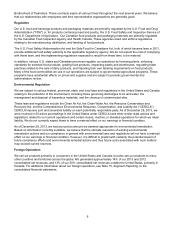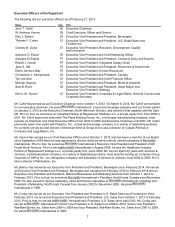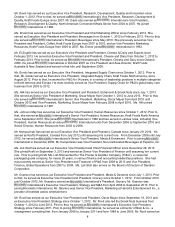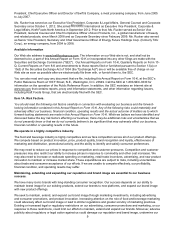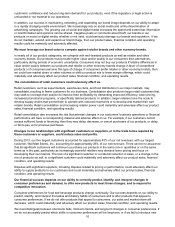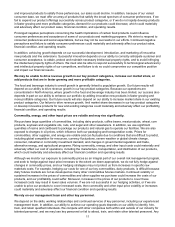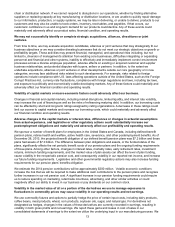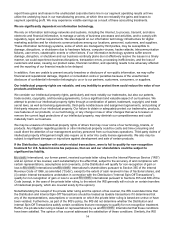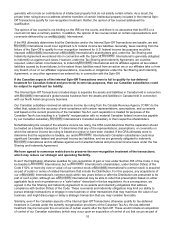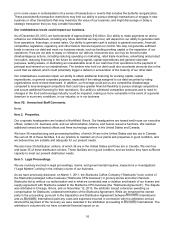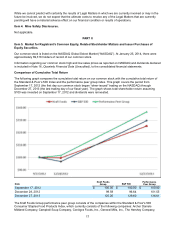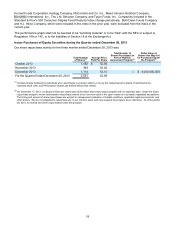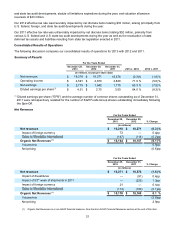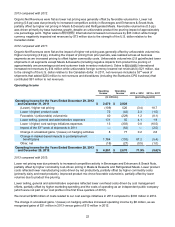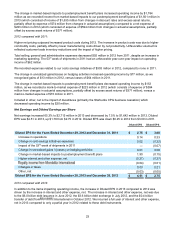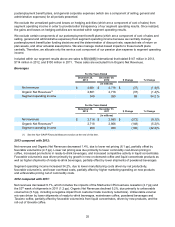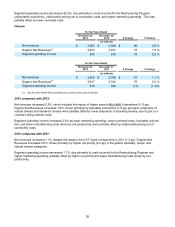Kraft 2013 Annual Report Download - page 18
Download and view the complete annual report
Please find page 18 of the 2013 Kraft annual report below. You can navigate through the pages in the report by either clicking on the pages listed below, or by using the keyword search tool below to find specific information within the annual report.
16
(or in some cases in contemplation of) a series of transactions or events that includes the butterfly reorganization.
These post-butterfly transaction restrictions may limit our ability to pursue strategic transactions or engage in new
business or other transactions that may maximize the value of our business, and might discourage or delay a
strategic transaction that you may consider favorable.
Our indebtedness levels could impact our business.
As of December 28, 2013, we had total debt of approximately $10 billion. Our ability to make payments on and to
refinance our indebtedness, including any future debt that we may incur, will depend on our ability to generate cash
from operations, financings, or asset sales. Our ability to generate cash is subject to general economic, financial,
competitive, legislative, regulatory, and other factors that are beyond our control. We may not generate sufficient
funds to service our debt and meet our business needs, such as funding working capital or the expansion of our
operations. If we are not able to repay or refinance our debt as it becomes due, we may be forced to take
disadvantageous actions, including reducing spending on marketing, retail trade incentives, advertising and product
innovation, reducing financing in the future for working capital, capital expenditures and general corporate
purposes, selling assets, or dedicating an unsustainable level of our cash flow from operations to the payment of
principal and interest on our indebtedness. The lenders who hold our debt could also accelerate amounts due in the
event that we default, which could potentially trigger a default or acceleration of the maturity of our other debt.
Our indebtedness could also impair our ability to obtain additional financing for working capital, capital
expenditures, or general corporate purposes, especially if the ratings assigned to our debt securities by rating
organizations were revised downward. In addition, our leverage could put us at a competitive disadvantage
compared to less-leveraged competitors that could have greater financial flexibility to pursue strategic acquisitions
and secure additional financing for their operations. Our ability to withstand competitive pressures and to react to
changes in the food and beverage industry could be impaired, making us more vulnerable in the event of a general
downturn in economic conditions, in our industry, or in our business.
Item 1B. Unresolved Staff Comments.
None.
Item 2. Properties.
Our corporate headquarters are located in Northfield, Illinois. Our headquarters are leased and house our executive
offices, certain U.S. business units, and our administrative, finance, and human resource functions. We maintain
additional owned and leased offices and three technology centers in the United States and Canada.
We have 36 manufacturing and processing facilities, of which 34 are in the United States and two are in Canada.
We own all 36 of these facilities. It is our practice to maintain all of our plants and properties in good condition, and
we believe they are suitable and adequate for our present needs.
We also have 39 distribution centers, of which 36 are in the United States and three are in Canada. We own four
and lease 35 of these distribution centers. These facilities are in good condition, and we believe they have sufficient
capacity to meet our present distribution needs.
Item 3. Legal Proceedings.
We are routinely involved in legal proceedings, claims, and governmental inquiries, inspections or investigations
(“Legal Matters”) arising in the ordinary course of our business.
As we have previously disclosed, on March 1, 2011, the Starbucks Coffee Company (“Starbucks”) took control of
the Starbucks packaged coffee business (“Starbucks CPG business”) in grocery stores and other channels.
Starbucks did so without our authorization and in what we contended was a violation and breach of our license and
supply agreement with Starbucks related to the Starbucks CPG business (the “Starbucks Agreement”). The dispute
was arbitrated in Chicago, Illinois, and on November 12, 2013, the arbitrator issued a decision awarding us
compensation for Starbucks’ unilateral termination of the Starbucks Agreement. While we remained the named
party in the proceeding, pursuant to the Separation and Distribution Agreement between International
and us, International paid any costs and expenses incurred in connection with the arbitration and we
directed the payment of the recovery we were awarded in the arbitration proceeding to International. The
arbitration’s outcome did not have a material financial impact on us.


